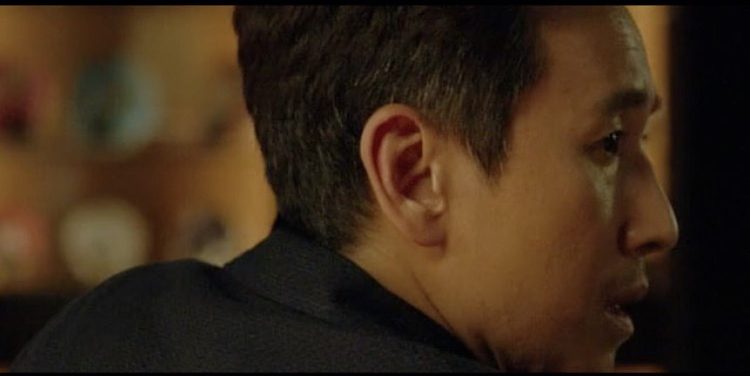‘Parasite’ Latches on to Audience Despite Language Barrier
@parasitemovie
Dong-ik, the father of the rich Parks, glances behind him before sharing a rumor with his wife. Photo Courtesy of @parasitemovie.
February 13, 2020
Praise for Director Bong Joon Ho’s Parasite (2019) has swarmed the movie industry, still growing as the film sweeps awards across multiple platforms. Despite being entirely in Korean, it received the Palme d’Or at the Cannes Film Festival, and went on to take Best Foreign Language Film awards at both the Golden Globes and The British Academy of Film and Television Arts (BAFTA). Most recently it won four Oscars at the 92nd Academy Awards, making it the first non-English film to win Best Picture. While Bong established himself in the western film industry with collaboration movies such as Snowpiercer or Okja, Parasite has a unique charm of its own that breaks down cultural barriers.
It presents the story of a poor family, the Kims, who sneak their way into the rich Parks’ household under the guise of unrelated employees. Their plan seems to go smoothly at first, but their relationship with the Parks slowly starts to crumble from external threats and glaring class differences.
This may seem like a simple, fairly standard plot, but Parasite deviates from the Hollywood formula of feel-good endings. For starters, it strays away from the typical association of rich with bad and poor with good, instead settling for a gray medium. The Kims quickly endear themselves to the audience, seemingly a classic ‘poor but contented’ family, who use street smarts to deceive the ‘oblivious and extravagant’ Parks. Simultaneously, they are willing to cheat other poor people out of jobs, and develop an unchecked resentment for the wealthy. The movie features raw, ugly brawls for survival, and the Kims don’t fight any fairer than their enemies. For example, midway through the movie, the Kims’ father Ki-taek makes a jibe about roaches fleeing when a light is turned on. The Kims and another poor family subsequently tear each other apart to gain the favor of the Park household, but when the Parks return unannounced from their camping trip, both parties scuttle away like the cockroaches earlier referenced. They crawl and roll under furniture to remain undetected, hiding in silence for hours before they manage to escape. The Parks may be classic hypocrites who maintain a false paradise, secretly enjoying the things they criticize the poor for. However, the Kims in turn forsake dignity and compassion as they desperately try to climb the social ladder, showing a realistic take on society. Bong avoids glorifying either social class, remaining focused on the devastating effects of class conflict.
Parasite is not a horror film, but it still leaves the audience member feeling uncomfortable and icky, like sitting in rain-drenched clothes. The movie taps into the more unpleasant aspects of society, such as the grimy semi-underground apartment of the Kims or the harsh apathy that power brings to even the most unfortunate. Bong mixes black comedy and powerful screenplay to criticize the often overlooked wealth gap in capitalist societies. Part of Parasite’s international appeal is its brutally honest representation of the hopelessness poverty brings, especially to youth, when there is no way to improve economic status. It may stick to Korean humor and cultural specifics, but the desperation of the characters can be felt even without subtitles. It constantly reminds the audience that they too may be blind to the privilege they possess, and that it’s always worth taking a look beneath before above.
Furthermore, Parasite balances its explosive plot with beautiful visuals. The transitions and camera movement are nearly immaculate; dynamic enough to be interesting, but smooth enough not to throw the audience off from the scene. The color scheme switches fluidly between idyllic to murky, highlighting the contrasting outlook of the Kims and Parks. Even the two families’ windows are a metaphor for their wealth; the Parks having a wide, clear view of their lawn, while the Kims have a narrow sheet of glass that fails to protect them from the outside world. These visual motifs aid in implanting the film into the viewer’s mind, revealing each object’s hidden symbolism one by one.
Showing off six years of painstaking development, Parasite is well-deserving of its title as Best Picture thanks to its universal message and flawless execution. While this film is R-rated and contains graphic violence, I would recommend it to just about any teenager or adult. As the title suggests, the movie takes a unique perspective on modern economy, showing how the rich and the poor leech off of each other and ultimately fail to improve society. Forgoing any sugarcoating and expertly reshaping the subject of privilege and class difference, Parasite is a jarring film that worms its way into your head.




